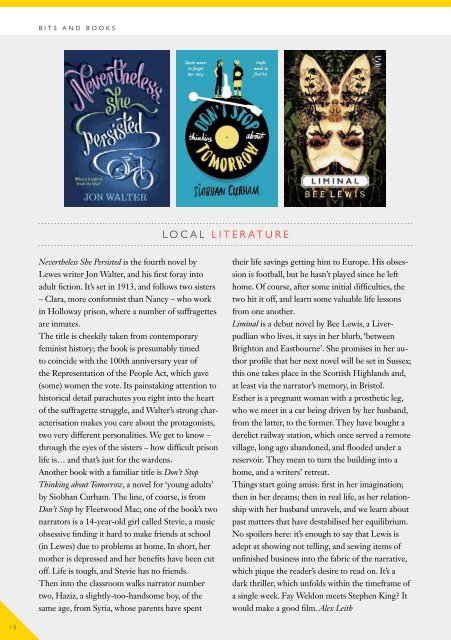Create successful ePaper yourself
Turn your PDF publications into a flip-book with our unique Google optimized e-Paper software.
BITS AND BOOKS<br />
LOCAL LITERATURE<br />
Nevertheless She Persisted is the fourth novel by<br />
<strong>Lewes</strong> writer Jon Walter, and his first foray into<br />
adult fiction. It’s set in 1913, and follows two sisters<br />
– Clara, more conformist than Nancy – who work<br />
in Holloway prison, where a number of suffragettes<br />
are inmates.<br />
The title is cheekily taken from contemporary<br />
feminist history; the book is presumably timed<br />
to coincide with the 100th anniversary year of<br />
the Representation of the People Act, which gave<br />
(some) women the vote. Its painstaking attention to<br />
historical detail parachutes you right into the heart<br />
of the suffragette struggle, and Walter’s strong characterisation<br />
makes you care about the protagonists,<br />
two very different personalities. We get to know –<br />
through the eyes of the sisters – how difficult prison<br />
life is… and that’s just for the wardens.<br />
Another book with a familiar title is Don’t Stop<br />
Thinking about Tomorrow, a novel for ‘young adults’<br />
by Siobhan Curham. The line, of course, is from<br />
Don’t Stop by Fleetwood Mac; one of the book’s two<br />
narrators is a 14-year-old girl called Stevie, a music<br />
obsessive finding it hard to make friends at school<br />
(in <strong>Lewes</strong>) due to problems at home. In short, her<br />
mother is depressed and her benefits have been cut<br />
off. Life is tough, and Stevie has no friends.<br />
Then into the classroom walks narrator number<br />
two, Haziz, a slightly-too-handsome boy, of the<br />
same age, from Syria, whose parents have spent<br />
their life savings getting him to Europe. His obsession<br />
is football, but he hasn’t played since he left<br />
home. Of course, after some initial difficulties, the<br />
two hit it off, and learn some valuable life lessons<br />
from one another.<br />
Liminal is a debut novel by Bee Lewis, a Liverpudlian<br />
who lives, it says in her blurb, ‘between<br />
Brighton and Eastbourne’. She promises in her author<br />
profile that her next novel will be set in Sussex;<br />
this one takes place in the Scottish Highlands and,<br />
at least via the narrator’s memory, in Bristol.<br />
Esther is a pregnant woman with a prosthetic leg,<br />
who we meet in a car being driven by her husband,<br />
from the latter, to the former. They have bought a<br />
derelict railway station, which once served a remote<br />
village, long ago abandoned, and flooded under a<br />
reservoir. They mean to turn the building into a<br />
home, and a writers’ retreat.<br />
Things start going amiss: first in her imagination;<br />
then in her dreams; then in real life, as her relationship<br />
with her husband unravels, and we learn about<br />
past matters that have destabilised her equilibrium.<br />
No spoilers here: it’s enough to say that Lewis is<br />
adept at showing not telling, and sewing items of<br />
unfinished business into the fabric of the narrative,<br />
which pique the reader’s desire to read on. It’s a<br />
dark thriller, which unfolds within the timeframe of<br />
a single week. Fay Weldon meets Stephen King? It<br />
would make a good film. Alex Leith<br />
18


















